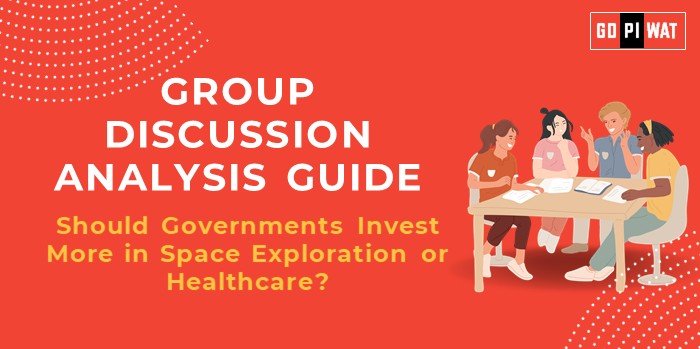📋 Group Discussion Analysis Guide: Should Governments Invest More in Space Exploration or Healthcare?
🌐 Introduction to the Topic
- Opening Context: The debate over prioritizing space exploration versus healthcare investment reflects the challenge of balancing long-term innovation with immediate human needs.
- Topic Background: Space exploration drives technological innovation and fosters international collaboration, while healthcare ensures population well-being and productivity. This dynamic poses critical policy decisions for governments globally.
📊 Quick Facts and Key Statistics
- 📈 Global Space Industry Value: $469 billion (2021) – Emphasizes the financial growth of the sector.
- 🏥 Healthcare Spending: 9.8% of global GDP (2022) – Highlights the essential role of healthcare in economic stability.
- 📜 NASA Budget (2023): $27 billion vs. U.S. Healthcare Budget: $1.2 trillion – Demonstrates resource allocation priorities in a developed country.
- ⏳ Life Expectancy Rise: +5 years (2000-2019) due to healthcare advancements – Reflects healthcare’s direct impact on society.
👥 Stakeholders and Their Roles
- 🏛️ Government: Allocating funds, driving research initiatives.
- 💻 Private Sector: Technological innovation in both fields.
- 🙋♀️ Citizens: Beneficiaries of healthcare and contributors to tax revenues for public funding.
- 🌍 Global Organizations: WHO for healthcare standards; NASA, ESA for space exploration.
🏆 Achievements and Challenges
✨ Achievements
- Space Exploration: Advancements like GPS and satellite communication.
- Healthcare: COVID-19 vaccine development within a year.
⚠️ Challenges
- Space Exploration: High costs and uncertain returns.
- Healthcare: Inequality in access, rising costs of treatments.
🌍 Global Comparisons
- Space: India’s Mars Mission ($75 million) vs. NASA’s Mars Curiosity ($2.5 billion).
- Healthcare: Scandinavian countries’ universal healthcare vs. developing nations’ gaps.
📚 Structured Arguments for Discussion
- 💪 Supporting Stance: “Investing in space exploration fosters innovation, enabling transformative technologies with global benefits.”
- ❌ Opposing Stance: “Healthcare is fundamental for ensuring a productive workforce and addressing immediate societal needs.”
- ⚖️ Balanced Perspective: “A balanced approach with proportional funding ensures both long-term technological progress and immediate societal health.”
💡 Effective Discussion Approaches
- 📊 Opening Approaches:
- “With the global space industry reaching $469 billion, does its growth justify its funding over healthcare?”
- “Healthcare spending comprises nearly 10% of GDP globally—can governments afford to prioritize other areas?”
- 🎯 Counter-Argument Handling:
- Space Exploration: “Technological spin-offs benefit healthcare directly, e.g., satellite-based telemedicine.”
- Healthcare: “Healthier populations drive long-term innovation and economic growth.”
🔍 Strategic Analysis of Strengths and Weaknesses
- ✅ Strengths: Economic growth from space technology, increased life expectancy via healthcare advancements.
- ❌ Weaknesses: Space exploration’s uncertain ROI, healthcare’s rising costs.
- 🚀 Opportunities: Global leadership in space, AI in diagnostics.
- ⚠️ Threats: Economic disparities, geopolitical tensions in space.
🎓 Connecting with B-School Applications
- 📌 Real-World Applications: Explore innovation financing models in healthcare and space sectors.
- ❓ Sample Interview Questions:
- “Which sector is more critical for a developing nation’s growth?”
- “How can space tech improve healthcare delivery?”
- 📘 Insights for B-School Students: Collaborative project ideas like public-private partnerships.


